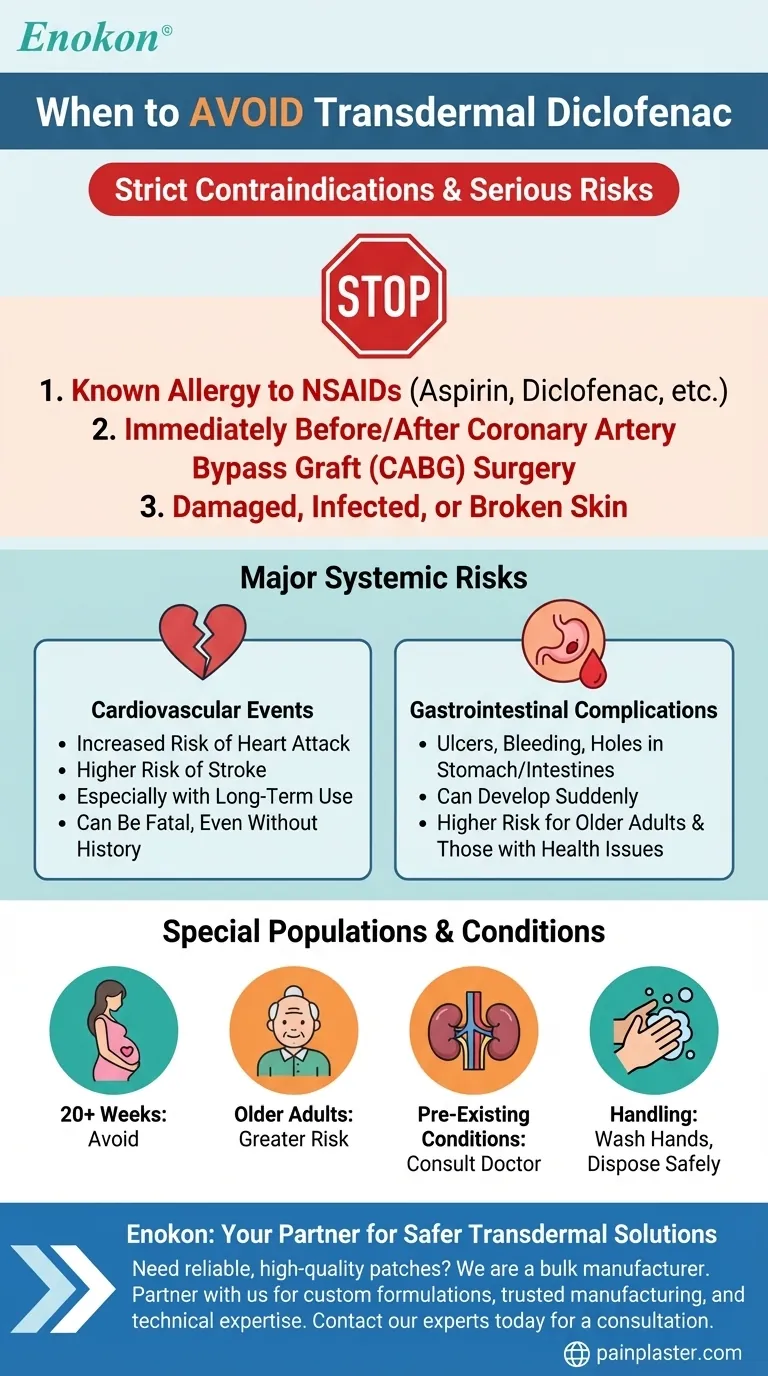Under no circumstances should you use transdermal diclofenac if you have a known allergy to diclofenac, aspirin, or other NSAIDs. It is also strictly contraindicated right before or after coronary artery bypass graft (CABG) surgery and should not be applied to damaged, infected, or broken skin.
While transdermal diclofenac offers targeted pain relief, it carries the systemic risks of all NSAIDs, including a higher chance of heart attack, stroke, and severe stomach bleeding, especially with long-term use or in high-risk individuals.

Understanding the Core Cardiovascular Risks
Nonsteroidal anti-inflammatory drugs (NSAIDs), including transdermal diclofenac, can increase the risk of serious cardiovascular events. This risk is a primary concern for anyone considering this medication.
Recent Heart Attack or Bypass Surgery
You must avoid transdermal diclofenac if you have recently had a heart attack.
Using this medication immediately before or after a coronary artery bypass graft (CABG) surgery is also a firm contraindication due to the elevated risk of heart complications.
The General NSAID Warning
The risk of heart attack or stroke can be higher for anyone using NSAIDs, even those without a history of heart disease. These events can occur without warning and may be fatal.
The danger increases for individuals who use the medication for an extended period.
The Danger of Gastrointestinal Complications
Like oral NSAIDs, diclofenac absorbed through the skin can cause severe damage to your digestive system.
Ulcers and Stomach Bleeding
NSAIDs may lead to ulcers, bleeding, or the formation of holes in the stomach or intestines.
These conditions are potentially fatal and can develop suddenly, without any prior warning signs.
Factors That Increase Your Risk
The risk of gastrointestinal harm is significantly greater for older adults, those in poor health, and individuals who smoke or regularly consume alcohol. Long-term use also magnifies this danger.
When Your Skin Is Not a Suitable Barrier
The condition of your skin at the application site is a critical safety factor. Applying the patch or gel to compromised skin can lead to adverse reactions and improper medication absorption.
Damaged or Irritated Skin
Never apply transdermal diclofenac to skin affected by eczema, open wounds, infections, or inflammation. The medication is only intended for use on intact, healthy skin.
Known Allergic Reactions
If you have ever had an allergic reaction (such as asthma, hives, or swelling) to diclofenac, aspirin, or any other NSAID, you must not use this product.
Special Populations and Handling Precautions
Certain individuals are more susceptible to side effects, and improper handling can pose a risk to the user and others.
Use During Pregnancy
You should avoid using transdermal diclofenac around or after 20 weeks of pregnancy unless specifically directed by your doctor, as it can pose risks to the unborn baby.
Older Adults
Individuals in older age groups may be at a greater risk for experiencing side effects, particularly those related to the stomach, kidneys, and heart.
Pre-Existing Medical Conditions
Always inform your doctor of your complete medical history before use. Conditions like asthma, high blood pressure, or kidney and liver disease can be complicated by NSAID use.
Safe Handling and Disposal
Wash your hands thoroughly after handling the patch or gel. Avoid contact with your eyes, nose, or mouth. To dispose of a used patch, fold it in half with the sticky sides together and keep it out of reach of children and pets.
Making the Safest Choice for Your Pain Relief
To use this medication safely, you must weigh its benefits against its significant potential risks in consultation with your healthcare provider.
- If your primary focus is safety due to heart or stomach history: You should discuss non-NSAID pain relief options with your doctor, as transdermal diclofenac carries serious risks for you.
- If your primary focus is treating pain over broken or irritated skin: You must wait until your skin has completely healed before considering this medication.
- If you have a known allergy to aspirin or other NSAIDs: You must not use this product under any circumstances.
- If you are generally healthy and using it for a short-term injury: Use the lowest effective dose for the shortest possible duration, exactly as prescribed by your doctor.
Ultimately, your safety depends on a transparent conversation with your doctor about your health history and a strict adherence to their guidance.
Summary Table:
| Situation | Recommendation | Key Risk |
|---|---|---|
| Allergy to NSAIDs (e.g., aspirin) | Strictly Avoid | Severe allergic reaction |
| Recent heart attack or CABG surgery | Strictly Avoid | Increased risk of heart complications |
| Damaged, infected, or broken skin | Do Not Apply | Improper absorption, skin reactions |
| Pregnancy (after 20 weeks) | Avoid unless directed by doctor | Risk to unborn baby |
| History of stomach ulcers/bleeding | Use with extreme caution | Severe gastrointestinal events |
Need a safer, reliable transdermal pain relief solution?
At Enokon, we are a bulk manufacturer of high-quality, reliable transdermal patches and pain plasters. We understand the critical importance of safety and efficacy in topical NSAID delivery.
Partner with us to:
- Develop custom formulations with our expert R&D team to meet specific safety and performance profiles.
- Source trusted, consistently manufactured patches for your healthcare or pharma brand, ensuring patient safety.
- Benefit from our technical expertise in transdermal technology to create optimal products for your target market.
Let's discuss how we can help you provide effective and safer pain management options. Contact our experts today for a consultation.
Visual Guide

Related Products
- Far Infrared Deep Heat Relief Patches Medicated Pain Relief Patches
- Far Infrared Heat Pain Relief Patches Transdermal Patches
- Heating Pain Relief Patches for Menstrual Cramps
- Asthma Cough and Pain Relief Patch for Adults and Kids
- Mugwort Wormwood Pain Relief Patch for Neck Pain
People Also Ask
- What are pain relief patches and how are they used? A Guide to Safe, Targeted Relief
- How do pain relief patches compare to other pain relief methods? Discover Targeted, Long-Lasting Relief
- How effective are pain relief patches for muscle pain? Target Localized Pain with Transdermal Delivery
- How do pain relief patches work? A Guide to Targeted, Long-Lasting Pain Relief
- How often should pain relief patches be used? Get the Right Schedule for Targeted Relief















